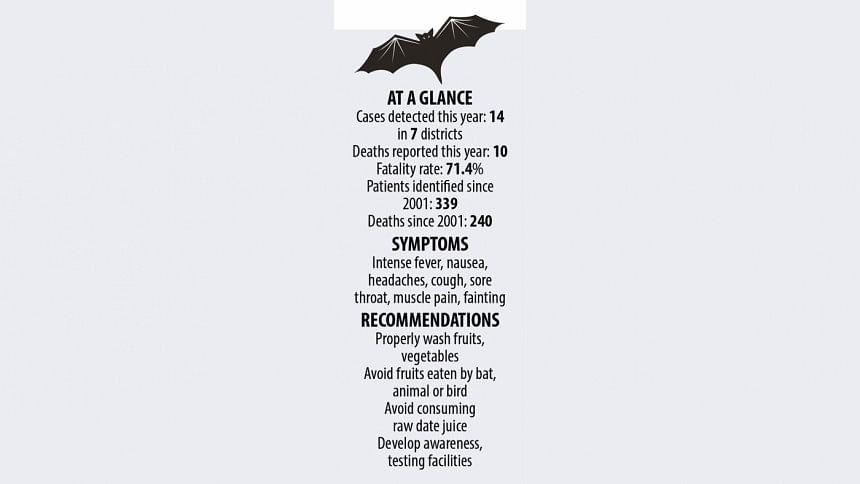Threat of Nipah virus looms large

In winter, people love to indulge in the season's delicacies, raw date juice being one of those.
However, most people are unaware of the danger it entails.
Consuming raw date juice, that might be contaminated, can get people infected with Nipah virus, which has a high-case-fatality rate of around 71 percent and no vaccine.
In Bangladesh, the virus was first detected in 2001, and since then, a total of 339 patients have been diagnosed, of whom 240 died, said the Institute of Epidemiology, Disease Control, and Research (IEDCR), which started its surveillance on Nipah virus in 2006.
This year, teenagers were mostly infected as 36 recorded cases were among under-20 age groups. Besides, the virus was found in a mother's breast milk in Rajbari district this year for the first time, according to IEDCR.
Nipah virus usually spreads to humans from animals or through contaminated food, but it can also be transmitted directly between people.
Experts said basic hygiene measures can prevent spread of the disease.
"Before eating fruits and vegetables, we must wash them properly. Any fruit that was eaten by a bat or any animal or bird should be avoided," said Mushtuq Hussain, a public health expert and an advisor to the IEDCR.
Symptoms of infection include intense fever, nausea, respiratory complication, headaches, cough, sore throat, muscle pain, and fainting, while severe cases can involve seizures and brain inflammation that result in a coma.
Officials of the Directorate General of Health Services said they have been conducting an awareness programme for the virus among healthcare service providers, including physicians, in 10 active hotspots and two other passive hotspots, but admitted that those are not sufficient.
Tahmina Shireen, director of IEDCR, said, "We need community-level awareness. We are running campaigns, but we need to do more to make people aware."
"Unlike other diseases, there are no readily available testing facilities for Nipah virus, and awareness is the only key to remaining safe from it," said Shahadat Hossain, director (MIS) of DGHS.
Experts said the government's awareness campaign has been inadequate, mostly limited to publishing newspaper advertisements and notices on government websites.
Although the hotspots of the virus have been identified, screening systems are absent in some of those, while testing facilities have not been developed at upazila-level and most district-level hospitals.
"The health directorate should have campaigned across the country using innovative approaches, so that people do not consume raw date juice under any circumstances," said Mushtuq Hussain.
"Many people don't even know about the disease. So, the more publicity is done in this regard, the less will be the risk of fatality," he added.
The IEDCR and icddr,b have been conducting Nipah virus surveillance programmes periodically at eight medical college hospitals to assess the spread and risk of the virus in Bangladesh.
According to IEDCR data, this year the virus spread in seven districts -- Rajshahi, Naogaon, Rajbari, Shariatpur, Pabna, Natore, and for the first time in Narsingdi.
This correspondent talked with civil surgeons of seven districts, and some of them said besides inadequate awareness campaigns, testing facilities are also not up to the expected level.
The physicians said they provide symptomatic treatment to patients coming with suspected Nipah virus infection.
If any patient remains untreated, the person can fall into a coma within 24 to 48 hours of contracting the virus, they said.
"As we don't have any testing facilities, we treat patients based on symptoms, and suspected patients are sent to either Faridpur or Dhaka," said Mohammad Ibrahim, civil surgeon of Rajbari.

 For all latest news, follow The Daily Star's Google News channel.
For all latest news, follow The Daily Star's Google News channel. 



Comments